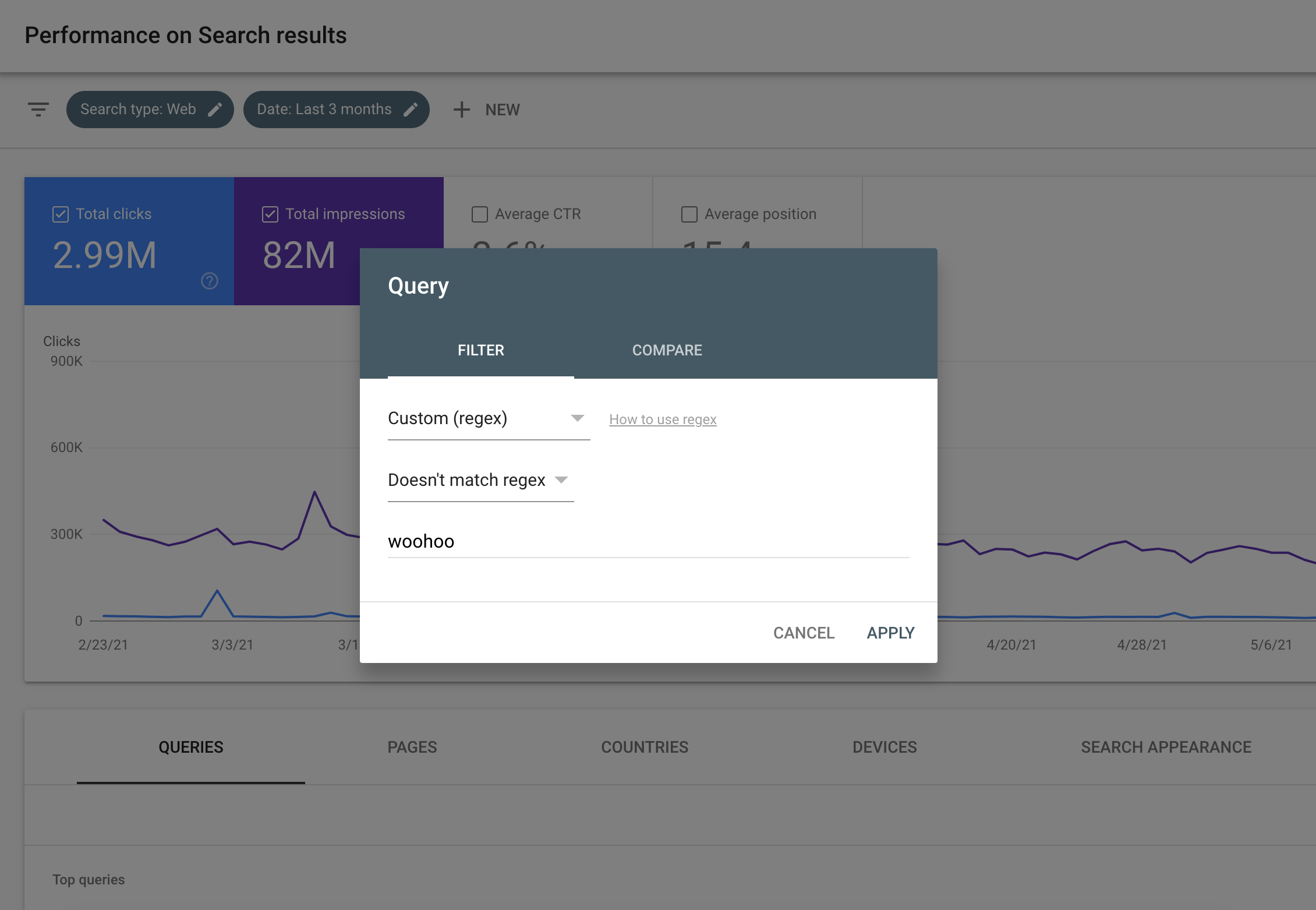الأربعاء 2 حزيران (يونيو) 2021
لقد أعلنّا مؤخرًا عن تحسينات أجريناها على فلترة البيانات في تقارير الأداء على Search Console، وسررنا بردود فعل المنتدى على هذا الإعلان.
وردنا أيضًا ملاحظات وآراء مثيرة للاهتمام، كما تلقّينا كالعادة طلبات كثيرة لإضافة خيار المطابقة السلبية إلى فلتر التعبير العادي استكمالاً لعملية التحسين هذه.
ويسرّنا إخبارك بأنّه اعتبارًا من اليوم، بات بإمكانك استخدام فلاتر التعبير العادي المطابقة وتلك غير المطابقة عند فلترة البيانات في تقرير الأداء. وهذا الخيار متوفر في قائمة منسدلة ثانوية تظهر عند تحديد الخيار "مخصص (تعبير عادي)" في أداة اختيار الفلاتر كما هو موضّح في لقطة الشاشة أدناه. اطّلِع على مزيد من المعلومات حول فلترة بيانات الأداء في "بحث Google".

نصائح سريعة حول استخدام التعبير العادي في Search Console
قد يكون من المفيد أن نقدّم لك بعض النصائح السريعة في حال بدأت حديثًا في استخدام التعبير العادي.
أولاً، ما المقصود بالتعبير العادي؟ يشير التعبير العادي باختصار إلى سلسلة من الأحرف تحدد نمط البحث. ويمكنك استخدام هذه السلسلة لإنشاء فلاتر متقدمة من خلال تضمين أو استثناء كلمة أو عبارة بحث واحدة أو أكثر. عند استخدام تعبير عادي، يمكنك تضمين مجموعة من الأحرف الوصفية التي تحمل معنى خاصًا، مثل تحديد معايير البحث. يمكنك الاطّلاع على جميع الأحرف الوصفية المتوافقة مع Search Console في مرجع بنية التعبير العادي RE2
لمعرفة الحالات التي يُستخدم فيها فلتر التعبير العادي بدلاً من أنواع الفلاتر الأخرى، يمكنك الاطّلاع أدناه على بعض الأمثلة حول الحالات التي يكون من الأفضل فيها استخدام التعبير العادي بدلاً من الفلاتر الأخرى:
- تصنيف المستخدمين الذين يعرفون علامتك التجارية: استخدِم تعبيرًا عاديًا يحدّد طرق مختلفة لتهجئة اسم شركتك،
بما في ذلك الأخطاء الإملائية. وسيساعدك ذلك في معرفة نوع طلبات البحث التي تستخدمها كل مجموعة من المستخدمين وتحديد الأقسام التي تجذب كل شريحة من هذا الجمهور على موقعك الإلكتروني.
على سبيل المثال، إذا كان اسم شركتك هو
Willow Tree، يمكنك إنشاء فلتر لكل تهجئة مختلفة، مثل :willow tree|wilow tree|willowtree|willowtee(يحل الحرف التعريفي|مكان حرف العطف "أو"). - تحليل الزيارات التي يسجلّها قسم معيّن من الموقع الإلكتروني: استخدِم تعبيرًا عاديًا يركّز على أدلّة محددة في موقعك الإلكتروني، ما يساعدك
على الاطّلاع على طلبات البحث الشائعة لكل جانب من المحتوى. على سبيل المثال، إذا كانت بنية عنوان URL هي
example.com/[product]/[brand]/[size]/[color]وأردت عرض الزيارات المؤدية إلى "أحذية خضراء"، ولكنك غير مهتم بعلامتها التجارية أو بمقاسها، يمكنك استخدامshoes/.*/green(يتطابق الرمز.*مع أي حرف لأي عدد من المرات). - فهم هدف المستخدم: استخدِم التعبير العادي لتحليل أنواع طلبات البحث التي تنقل المستخدمين إلى أقسام مختلفة من موقعك الإلكتروني.
على سبيل المثال، قد تكون مهتمًا بطلبات البحث التي تضم أدوات استفهام، وبالتالي قد يعرض فلتر طلب البحث
what|how|when|whyنتائج تشير إلى أنّ محتوى موقعك الإلكتروني يجيب عن أسئلة المستخدمين بسهولة، مثلاً من خلال قسم "الأسئلة الشائعة". وقد تكون مهتمًا أيضًا بطلبات البحث التي تضم (أو لا تضم) كلمات مرتبطة بالمعاملات الشرائية، مثلbuy|purchase|order. ويمكن أن يساعدك ذلك أيضًا في عرض أسماء المنتجات التي غالبًا أم نادرًا ما تُستخدم مع هذه التعبيرات.
راجِع مركز المساعدة في Search Console للاطّلاع على التعبيرات العادية
الشائعة. إذا كان لديك أي أمثلة جيّدة على حالات استخدام التعبير العادي، يمكنك مشاركتها على Twitter باستخدام هاشتاغ #performanceregex.
وإذا كان لديك أي أسئلة أو استفسارات، يُرجى التواصل معنا من خلال منتدى مجموعة خدمات بحث Google أو على Twitter.
